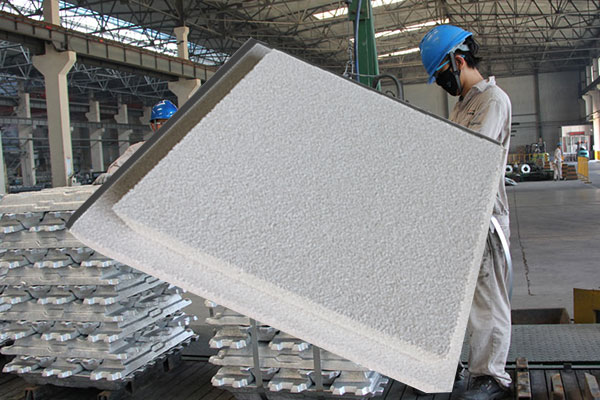CFF Filter for Molten Aluminum Filtration is a ceramic foam filter made of molten metal passed through neutral or active material to remove suspended inclusions in the melt.
As the molten aluminum alloy stream passes through the tortuous path of the ceramic foam filter, non-metallic inclusions are trapped within the ceramic structure.
The filtered metal is noticeably cleaner. Cleaner metal results in higher-quality castings, less scrap, and fewer inclusion defects, all of which help improve profits.
Ceramic foam filter sizes are available in sizes from 7″ to 26″ square with pore sizes ranging from 20 PPI to 80 PPI.

CFF Filter for Molten Aluminum Filtration includes a preheat point for temperature indication. Safely sealed and other proprietary gasket formulations ensure a secure fit in the filter bowl.
Casting generally adopts vertical or horizontal water-cooled semi-continuous casting. In order to improve the structure and surface quality of the vertical casting billet, electromagnetic crystallization groove, short crystallization groove, and hot top casting method have also been developed.
The water-cooled semi-continuous casting method is to introduce the liquid metal into the water-cooled mold through the launder, the liquid metal is cooled to form a solidified shell, and the mold is pulled by the base of the casting machine or falls off the mold to form a billet by its own weight.
Process parameters vary by alloy composition and billet size. Generally, the pulling speed and cooling speed should be increased as much as possible, and the height of the crystallization tank should be reduced.
The casting temperature is usually 50 to 110°C above the liquidus of the alloy. In addition, the continuous casting and rolling process of the aluminum strips has also been developed.
Ceramic Foam Filter for Molten Aluminum Filtration is widely used in the aluminum casting process. With their excellent resistance to attack and corrosion from molten aluminum, they can effectively remove inclusions, reduce trapped gas and provide laminar flow, and then the filtered metal is significantly cleaner. Cleaner metal results in higher-quality castings, less scrap, and fewer inclusion defects, all of which contribute to bottom-line profit.

